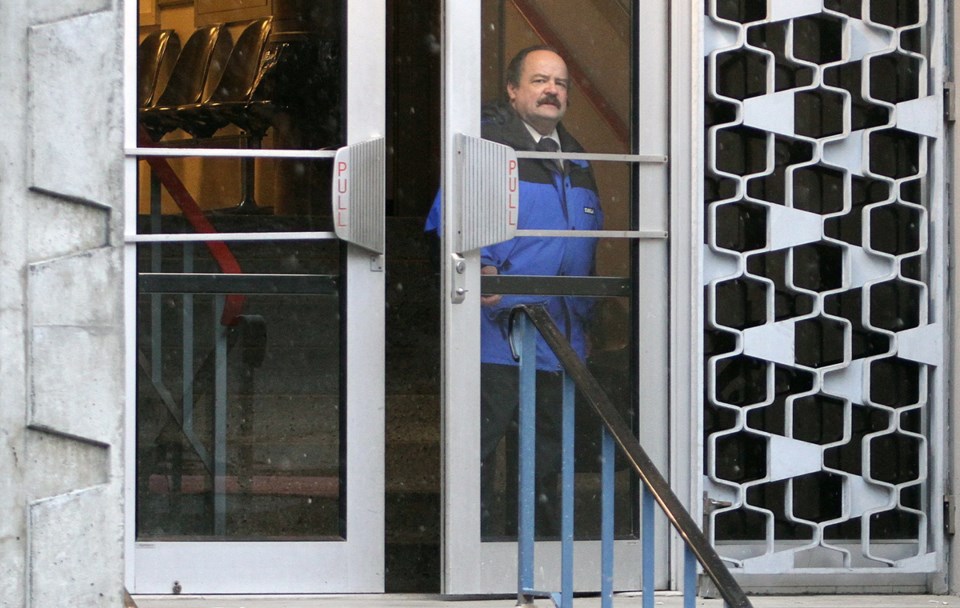A former Victoria Scout leader has been convicted of sexual offences against two boys who were in his troop more than 20 years ago.
On Friday night, a B.C. Supreme Court jury convicted John Viszlai, 55, with confining, sexually assaulting and touching a young boy for a sexual purpose between Dec. 23, 1991, and Dec. 22, 1994. Viszlai was also convicted of sexually assaulting and, while in a position of trust, touching for a sexual purpose a second boy between Jan. 1, 1989, and Dec. 31, 1992.
The jury, which had been hearing evidence since the trial began June 17, had been deliberating since Wednesday afternoon.
Viszlai, who was a Scout leader from 1973 to 2001, pleaded not guilty to the charges and took the stand in his own defence.
“Obviously, we’re disappointed with the verdict and considering an appeal,” said his defence lawyer, Donald McKay, on Saturday.
He expects Viszlai will be sentenced some time in September.
This is Viszlai’s second trial and second conviction on the charges.
In January 2011, a B.C. Supreme Court jury found Viszlai guilty of sexually assaulting the two boys. He was sentenced to three years in prison.
After spending a weekend in jail, Viszlai appealed his conviction. In November 2012, the B.C. Court of Appeal overturned his conviction and ordered a new trial.
During the trial, the jury saw photographs and documents and heard evidence from the two complainants, now ages 32 and 37. The two, who were 12 and 15 at the time of the alleged offences, were Scouts under Viszlai’s leadership in the 1980s and 1990s. The boys were not in Scouts together and did not know each other.
Both victims testified they were very active and went hiking and camping with Viszlai. They described him as a very knowledgeable, experienced and skilled Scout leader and both held him in high regard.
The jury heard that the relationship went beyond scouting. Both boys developed a social relationship with Viszlai, visiting his home, eating meals there and working in the yard.
The first victim, whose name is protected by a court order, testified that he was given special treatment and extra privileges by Viszlai. He described how Viszlai talked about mystical and psychic abilities, and testified that Viszlai asked him to engage in an activity, telling the boy it would develop his psychic ability. That activity involved ropes, pulleys and anal penetration of the boy with an object while he was naked, tied up and blindfolded. He testified that he confronted Viszlai years later about what happened and Viszlai admitted he did this.
The jury also heard a 2007 police interview when Viszlai referred to the contraption as a “Judas chair.”
The second victim testified that Viszlai had him pose for nude photos. He also said that Viszlai encouraged him to squat down while he was scantily clad and submit to being penetrated by a broom handle.
When the Court of Appeal overturned Viszlai’s first conviction, Justice David Frankel said it could not stand because of the instructions the trial judge gave to the jury about certain evidence that arose while the jury wasn’t in the courtroom.
That evidence referred to admissions Viszlai made in an interview and an apology he wrote to the two alleged victims after his arrest at a scout jamboree near Sechelt in 2007.
Frankel says the lower court judge told the jury it was required to accept a ruling that Viszlai’s statements were “voluntary” and that the interview techniques used by a police officer “did not cross the line into improper behaviour.”
He says the instructions could have confused jury members and influenced their decision that any admissions made by Viszlai during the interview were unreliable.
Frankel says Viszlai was substantially prejudiced by what the trial judge said in her instructions about the evidence.



